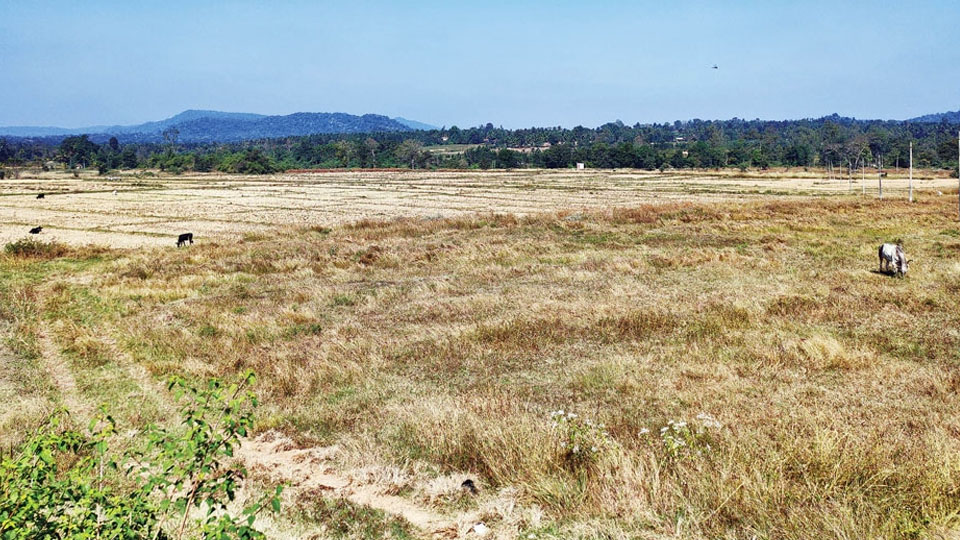By Girish Baga, Athena Educational Services
Agriculture is the sole source of livelihood in rural India. It not only puts money in the pockets of villagers but also feeds India. On March 19 this year, the Karnataka Government brought an amendment to Section 109 of the Karnataka Land Reforms Act 1961, which allows industries to sell agricultural land converted for industrial use after seven years.
The amendment looks to be in line with the promise made to investors in World Economic Forum held at Davos recently. Section 109 had restricted industries from selling agriculture land bought for industrial use. It required the land to be given back to the Government at zero cost in the event of failure of a firm or inability of a Corporation to carry on with the business.
Now, with this amendment, industries can buy and convert agricultural land for industrial use within 30 days. All an industrialist has to do is first purchase the agricultural land from the farmer. Then apply for conversion with the respective Deputy Commissioner (DC). If the DC does not raise any objection within 30 days after submission it is deemed approved and converted. This is a clear walk away from the practice of allotment through Government agencies like Karnataka Industrial Area Development Board (KIADB) etc.
The Government has also decided to amend State Land Reforms Act 1961 law that restricted non-farmers from buying agricultural land. Sections 63-A, 79-A, B and C under the Act will be repealed. With all these changes in the Sections, the ceiling on income of Rs. 25 lakh from non-agricultural source to purchase farmland will be eliminated. Any Indian individual, Trust, Society, Company or educational institution will be allowed to buy agricultural land.
The rationale behind these changes according to stakeholders are: One, to reduce already existing 12,000-odd cases registered in different courts pertaining to violation of this Act. In the last 45 years, about 83,000 cases have been registered for violation under the Act. Two, many say post-COVID-19, India stands a better chance as an alternative to China and these land reforms will increase our competitiveness. Three, earlier HNI’s (High Net worth Individuals) in the State who wanted to get into farming were forced to buy agricultural land in neighbouring States as Karnataka had restrictions, now they can do it in Karnataka itself.
These changes could lead to large scale buying activity which could have significant implications in the years to come. One estimate says Karnataka has 98.95 lakh hectares of cultivable land out of which 22 lakh hectares are not under cultivation as of now. The 23% of fallow land will add to further conversion of agricultural landmass to different purposes other than agricultural activities. Is this a wise decision by the Government when pandemic like COVID-19 is teaching us to have food security and self-sufficiency?
It is not just about farmers, even real estate developers, who are already in deep crisis, may be severely affected with the sudden availability of large supply of converted land. The developers will bear the brunt in the next few months as the premium assigned to converted land will disappear with new land acquisition becoming relatively cheaper.
Now this raises a question whether any individual with a decent affordability would move to the city outskirts to own farmland with a house considering the same budget of owning a site or a house in the vicinity of any city? It will also be interesting to see how the Government will manage the land bank already held by KIADB or any other Urban Development Authority.

The recent ordinance on APMC Act which allows the farmers to sell their produce in the open market instead of APMC will further favour large Corporations which have for long nurtured an ambition to take part, actively and directly, in India’s food supply chain. Now these Corporations can not only buy huge tracts of agricultural land in every district but also sell it in their retail stores or the open market. The rationale of the Government in this matter is that it creates a competitive market and better pricing for farmers’ yield. But which farmer will hold the land, considering the predatory pricing offered to them by Corporations to buy their land?
What will happen to poor farmers who will be displaced and eventually become labourers on their own land? The country has 95% marginal farmers with less than 1-2 acres of land-holding. The repercussions on a long run look alarming considering the large population of farmers.
We have seen the migrant workers’ problem during the pandemic. Who are these migrant labourers? They are from villages. According to 2011 census, there are more than 6.5 crore migrant labourers in the cities of India and 99% of them are displaced and deprived farmers from different parts of the country.
Now we have to introspect whether it should be seen as an opportunity for the farmers to get better price for their land or has this pandemic made our Government explore a new revenue stream at the cost of poor and helpless farmers? The Government also seems to be inclined to take the ordinance route without any debate in the Assembly to pass these amendments. This short-term benefit will have serious consequences in the long run, which could affect the Socio-economic eco-system of our State.








Recent Comments